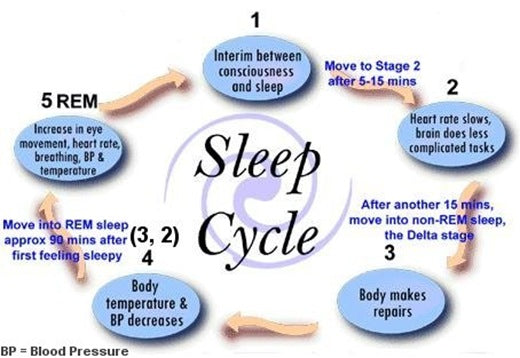Sleep : we all need it, we all crave it, we all demand for it and we all do it. But have you ever wondered about the mystery that is sleeping? Like for example : why do we even need to sleep? Or what happens to our minds and our bodies when we sleep? Well the following article is meant to answer those questions of yours and unlock some knowledge on our nightly habit of slumber.
What is sleep?
Sleep is medically defined as : “the body’s rest cycle”. To put it any simpler terms is quite difficult, because sleep is not necessarily what we perceive it to be. Some may say that sleep in a state of unawareness and unconsciousness, but research has shown that we are aware and in some cases, we can control our sleep. Therefore, to make it easy : we refer to sleep as a period of time for the body to rest and recuperate.
Why do we sleep?
The definitive reason as to why we sleep has not been determined yet. But science and research has come up with some theories.
One theory explains that sleep is a process for our body to wash out neurological toxins that accumulate in our brain all day. During sleep, these toxins are excreted out of our body to ensure that they do not accumulate in the brain and cause potential damage to the brain.
Another theory explains that sleeping is a process of growing. Although there is factual evidence behind this, certain hormones are excreted out more during sleep (growth hormone) that facilitates in the growth of our bodies, the theory is still inconclusive.
One other theory that is presented as a means of reserving energy. The energy that we accumulate throughout the day needs to be properly stored to sustain for an event that requires energy, therefore sleep is a process of efficiently storing the energy, at maximum potential.
Stages of sleep
In sleep : we have two main stages : NREM (Non-REM) and REM. REM is an abbreviation for rapid eye movement. Firstly NREM has 3-4 (depends on who you ask) stages. And they are as follows :
Stage 1 (NREM) : This is the first stage of your sleep, and the most vulnerable stage. At this stage, any disturbance can cause the individual to wake up. This stage is what people mostly commonly associate with “nodding off”. The phase of losing momentary consciousness. It usually lasts from 5 to 7 minutes depending on the individual.
Stage 2 (NREM) : This is also a vulnerable stage, a stage of light sleeping as well. At this stage, our brain waves start to slow down and decrease in frequency. This stage is a usually the plateau of a power-nap. Because at this stage, it is enough to get some decent sleep and not be groggy when you wake up.
Stage 3 & 4 (NREM) : This is the commencement of the deep sleep progression. At this point, the brain waves are significantly slower than any of the prior stages. This is not where you start dreaming but this is the where you experience the deepest sleep, a phase that is hard to wake up from. Also, at this point, your body does a lot of restorative processes such as muscle regeneration, immunity boosting and energy storing.
REM sleep : This is infamously known as the dreaming stage. Usually occurring 90 minutes after Stage 1 of NREM, depending on the individual. It is where you get the soundest sleep. At the point, your brain goes into overdrive : increasing brain wave frequency and rate. At this time as well, your eyes start to flutter about in jerky movements, such as the name suggests. At this time is the optimal time for your mind to consolidate information and retain short-term memory into long-term memory. That’s why it is advisable to study before you sleep, you retain information better.
How much sleep do we need?
Sleep is very important and the amount of sleep that we receive is also very important. As it can affect our bodies accordingly. According to researchers, it is estimated that the average adult (ranging from 18 years old to 64 years old) needs 7 to 9 hours of sleep, per night. The value changes for infants, needing 14 hours a day, and children, 8 to 10 hours a night.
But for adults, for maximum efficiency and productivity : it is recommended that they get 7 to 9 hours of undisturbed sleep every night.
Sleeping disorders
Just like any other physiological process in our bodies, there is bound to be some disorders that come associated with it. Some of the sleeping disorders include :
Insomnia : characterised by the inability or difficulty in falling asleep or staying asleep. Causes of insomnia vary from stress, pre-existing illness, emotional or physical discomfort, environmental factors, medications or sleep schedule disturbances.
Hypersomnia : characterised by excessive sleeping habits, excessive daytime sleeping or having difficulty staying awake throughout the day. Causes of hypersomnia can vary from alcohol/drug abuse, sleep deprivation, medication, genetics, depression, narcolepsy or obesity.
Obstructive Sleep Apnoea : is the condition where upon sleep, the patient experiences difficulty in breathing or the breathing becomes shallow. Causes range from obesity, upper respiratory tract infection, deviated septum, aging and more
Narcolepsy : is a neurological disorder of having the inability to control their sleep and awareness. Narcolepsy patients usually find themselves very fatigue or sleepy throughout the day, and they may unexpectedly fall asleep, involuntarily. This refers to sleep attacks. Symptoms of narcolepsy include excessive daytime sleepiness, sleep paralysis, sleep walking, hallucinations or cataplexy (involuntary loss of muscle tone and muscle weakness).
--------------------------------------------------------------------------------------------------------------------
Article is written by:
Fatin Najwa binti Daud, is a medical student studying at IMU Malaysia. She is a freelance writer of this blog at Zaahara. Interests include music, art, sports and travel.
-Photos are taken from google images
© 2016 Zaahara Ventures Sdn. Bhd.



